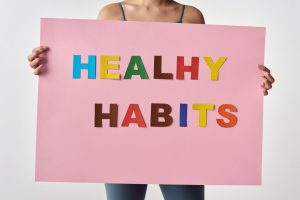As we grow and evolve, we tend to have new behaviors we’d like to develop to better our schedules, our relationships, and our lives. If you’re like me, you start new habits strong, but then…the old behaviors start creeping back in. I wanted to change that, so I looked into how to start new habits and want to share what I’ve found.
My husband habits well. By that, I mean he’s good at creating and sticking with new habits, which I admire. He amazes me with how he always gets up at a certain time every day–with NO alarm. He then reads his daily motivation book, meditates, gets dressed, eats breakfast, checks email, and goes to the gym. All regularly and at the same time.
I am different; my morning routine is improving, but it depends on my calendar, how late I want to sleep, or some other 
Basically, anything you read or listen to about habits comes from their foundational research, and that’s been the case for decades. Their research boils down to three essential parts of creating a habit. They are:
- The new behavior or new habits you want to start.
- The cue or trigger for the habit.
- A reward for consistency.
I think it’s important to note that the definition of a habit is simple. It’s a behavior you do so often it’s automatic–not thinking about it, no drama or feelings about it; it’s just what you do. Some examples include brushing your teeth or leaving for work at a certain time each day. Other examples include stopping at that coffee place each morning or checking your phone when you wake up. Eating when you’re hungry; looking when someone calls your name. It’s just what you do.
Why Are Habits Important?
Why is it important to have good habits? Research shows that habits can change our identity, help us see ourselves differently, and impact us greatly. For instance, I have a friend named Becca who wanted to run a marathon, but she wasn’t a runner!
In order to reach her marathon goal, she needed to create habits. Becca started each day the same way; she set her clothes out the night before and got up 30 minutes earlier so she could walk or run for 30 minutes. Every day, she added a bit more to that walking or running, and after just a couple of weeks, she started seeing herself differently. She loved it! She not only felt better about herself, but she called herself a runner! Yes, in her mind, her identity had changed, and while she hasn’t run the marathon (yet!), her habit of walking and then running positively changed her identity for her.
What Do Habits Do For You?
In the beginning, habits are something that we do over and over. Habits help us achieve goals, and they change who we are
and how we see ourselves. This goes for good habits but also for the not-so-good habits. However, the interesting thing about bad habits is that research says desire alone is not enough to make us change a bad habit to a good one. Neither is willpower; we ALL have the desire and know how to make changes, and we likely know why we want to. Unfortunately, desire or emotion around wanting something different so badly can actually stop us from actualizing it! Say you wanted to write a book–you know you’re destined to do it. Instead, you sit in overwhelm and start doubting yourself as you anticipate what others may say, and voila. You’re right back to binging something on Netflix or another familiar habit that’s comfortable.
That’s why science is helpful; looking at habit forming scientifically allows you to take the emotion out and focus on the three things we really need to change the habit.
Three Steps To Start New Habits
Research suggests that if you used the three foundational steps to start new habits, it would look like a process. For example, if you wanted to write that book, here’s how it might look:
- You’d sit down and write every day. Yes, every day. That’s the small step start for the new behavior.
- You’d identify the cue you need. Have whatever you need–all of it–at your ready. Your laptop or desktop is open and ready to go, pens/pencils/markers/whiteboard, etc. Whatever you need to get the writing juices going.
- Figure out and execute your reward. Our brains LOVE rewards–we always appreciate a good dopamine hit as a reward, so decide how you’ll treat yourself if you sit and write as planned. Research suggests that for the reward to be part of the habit-forming process, it needs to happen within minutes of doing the new behavior. Maybe it’s sharing what you’ve written with a friend–that’d be a reward for me because we could celebrate together.
The more we reward ourselves, the more our brains crave doing the new habit to earn the reward!
What Behavior Change Do You Want To Make?
What are you looking to change? What new habit do you want to start? Is it eating healthier? Regularly exercising? Working
on that new book? Maybe it’s just being a bit more social?
Whatever it is, here are some tips for identifying and creating new habits. I suggest you get your journal and write this down just for more stickiness in your brain!
- First, identify the old behavior you want to change. Write it down.
- Next, what’s the current trigger or cue for that old habit? What makes you want to do that old habit? Write that down too.
- Last, think about what reward you get for doing that old habit. Write that down.
Science tells us that we won’t change an old habit unless we have a new one to replace it, so the next steps are to think of the new habit you want to use as a replacement. Then think of a new trigger or cue for that habit and decide what reward you’ll get every time you follow this new behavior.
You may want to drink 64 oz. of water instead of coffee all day. Put water bottles by the coffee maker, at your desk, in your car…every where you may be tempted to have coffee. Make water very visible and accessible.
When you drink more water, text or call a friend so they can celebrate with you. This is actually a new habit I wanted to create in my life, so a friend of mine and I would text each other pictures of our empty water bottles when we downed them to celebrate with each other! The fun and celebration in that reward help tell my brain this is a habit we enjoy and want to do again.
Then you continue; small steps lead to big changes. I know you can do it, and you’ll be so proud of yourself when you do!





0 Comments